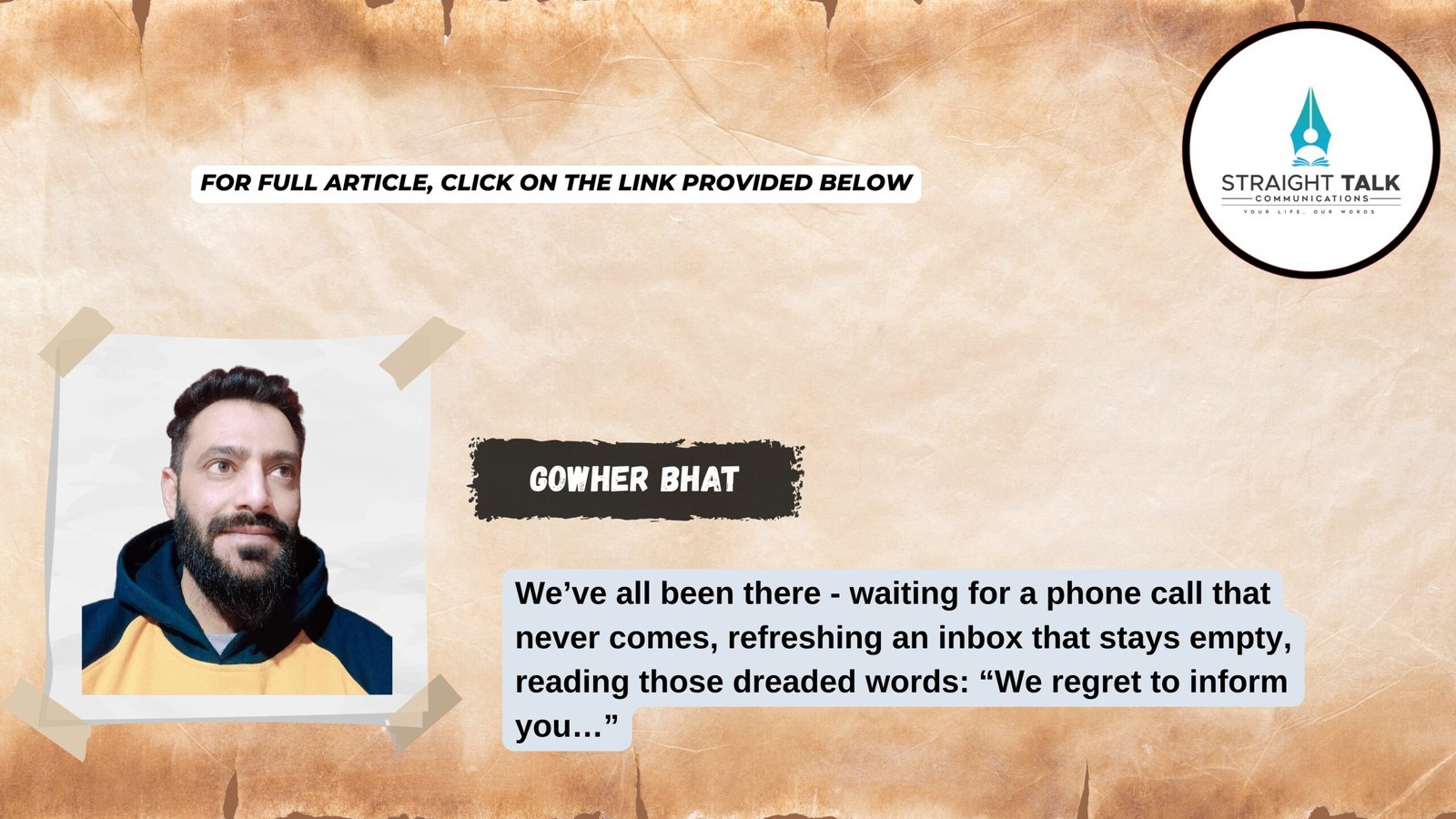Rejection is a Redirection: A Blessing in Disguise

Gowher Bhat
We’ve all been there – waiting for a phone call that never comes, refreshing an inbox that stays empty, reading those dreaded words: “We regret to inform you…”
No matter how strong you are, rejection stings. It unsettles something deep inside, especially when you’ve poured your heart into something. And in places like ours where degrees gather dust and opportunities are scarce – rejection doesn’t just disappoint, it cuts deep. It feels personal.
But over time, I’ve come to believe something else. Something quieter. Something true.
What if rejection isn’t a failure? What if it’s a redirection?
That thought came to me one quiet February morning. The snow was melting, roads were wet and brown and the sky hung heavy with the last weight of winter. Sitting by the window, sipping kehwa, I remembered something Muhammad Ali once said: “It’s not the deer that is crossing the road – it’s the road that is crossing the forest.”
And just like that, it all began to make sense.
In life much like that forest we often find ourselves crossed by roads we never expected: detours, delays, disappointments. Especially here, where jobs are rare, summers are harsh, and winters seem endless. Every rejection feels like a slap of cold wind. Every missed opportunity weighs like snow on a tin roof in January. But maybe rejection isn’t a stop sign. Maybe it’s a reroute. A whisper from life, nudging us gently: Try another way.
Rejection hurts most when you’ve given it your all. When you’ve studied late, prayed hard, prepared carefully only to be told, “You’re not selected.” It feels like more than a lost opportunity. It feels like a locked door to your future.
Dr. Samantha Stein, a U.S.-based psychologist, explains: “Rejection activates the same parts of the brain as physical pain. But it also gives us the chance to build mental muscle to reflect, reframe, and reorient.” And according to Dr. Rakhi Anand of Apollo Hospitals, New Delhi: “Rejection can trigger loneliness and low self-worth. But those who acknowledge it and reframe the narrative often grow stronger and more self-aware.”
In other words, rejection is painful, yes but it’s also a teacher. It tells us where not to go, so we can discover where we truly belong.
Consider J.K. Rowling – the best-selling author in the world today. Before Harry Potter became a phenomenon, her manuscript was rejected by 12 publishers. She was a single mother living on welfare, scribbling in cafés between job rejections. One editor even told her, “Don’t quit your day job.” But she didn’t give up. Today, Harry Potter and the Philosopher’s Stone has sold over 120 million copies, and Rowling’s story reminds millions that failure can become fuel.
Or take Steve Jobs, who was fired from Apple – the very company he co-founded. He called it “a devastating blow.” But during that period of rejection, he built NeXT and Pixar – companies that transformed technology and storytelling. Eventually, he returned to Apple and led one of the greatest corporate comebacks in history.
And then there’s Amitabh Bachchan, rejected by All India Radio for having a “heavy voice.” That same voice later became one of the most iconic in Indian cinema.
These aren’t just stories of success. They’re stories of redirection – of paths reshaped by rejection.
Closer to home, the stories may be quieter but no less powerful. Across Kashmir, in small towns and dusty lanes, young men and women sit beneath slow-turning ceiling fans, surrounded by books, admit cards, and silent hope. Hope that flickers with every merit list where their name doesn’t appear. Each “no” weighs heavier than the last.
I remember meeting a young man from Anantnag who was rejected by five schools for a teaching post. Disheartened but not defeated, he started tutoring two children on his verandah. Five years later, that verandah turned into a full-fledged coaching centre. He told me, “A job didn’t take me in. So I made one.”
That’s the quiet miracle of redirection. And it’s happening all around us – every single day.
A 2023 study by psychologists at Amity University found that students who experienced repeated rejection built stronger long-term resilience when they didn’t internalize the rejection, reflected on their strengths, and channeled disappointment into learning or service. The study concluded that rejection can boost emotional immunity if we choose to learn from it, not crumble under it.
Dr. Meghna Gupta, a clinical psychologist, puts it beautifully: “Rejection could clip your wings or teach you how to fly differently. You just need to find a new current in the sky.” And sometimes, that sky is wide open. We just haven’t looked up yet.
If you’re reading this surrounded by forms, results, or silence – this is for you.
You are not alone. You are not behind. You are not forgotten. Every “no” you’ve received is doing quiet work behind the scenes. It’s shaping something you might not see right now – a new direction, a deeper purpose, a more resilient version of you.
Sometimes, it’s not the deer crossing the road. Sometimes, it’s the road that must pass through your forest without disturbing your roots.
In Kashmir and beyond, the seasons are harsh. Winters freeze ambition. Summers scorch patience. But just as the earth softens for spring, so too does life offer new beginnings after the hardest rejections.
Rejection is not the end of your story. It might just be the chapter that turns everything around.
So the next time a door closes, a result disappoints, or a plan falls apart – don’t collapse. Pause. Breathe. Reframe. Begin again.
And someday, with the gift of hindsight, you’ll say: “Shukr hai, I was rejected then. Otherwise, I wouldn’t be standing here now.”
(Gowher Bhat is a published author, freelance journalist, book reviewer, and educator based in Kashmir.)







